3. Vortex DDS Virtual Instruments (VIs)¶
The DDS LabVIEW Integration provides a function palette with custom virtual instruments (VIs) to model reading and writing data with DDS.

The Vortex DDS LabVIEW VIs are included in VortexDDS functions palette.
The following DDS VIs are provided:
create_participant.vi
create_publisher.vi
create_subscriber.vi
create_writer.vi
create_reader.vi
wait_historical_data.vi
delete_entity.vi
3.1. DDS VIs usage¶
The typical way to model a DDS application in LabVIEW is as follows:
model your DDS topics using IDL
using the LabVIEW IDLPP process generate DDS Topic, Read and Write VIs from the IDL file
add the generated VIs to your LabVIEW project
create a DDS LabVIEW application using the VortexDDS functions palette and the generated VIs from the previous step
3.2. QoS Profiles¶
In DDS - “The Data-Distribution Service (DDS) relies on the usage of QoS. A QoS (Quality of Service) is a set of characteristics that controls some aspect of the behavior of the DDS Service.”
Each DDS entity VI has an associated QoS profile. By default, the OSPL default profile is used. An XML file that specifies QoS profiles can be used to set the QoS of a DDS entity.
The QoS profile of an entity is set using the qos_uri and qos_profile terminals.
Please see section QoS Provider for more information.
3.3. create_participant.vi¶
The create_participant VI represents a DDS domain participant entity.
In DDS - “A domain participant represents the local membership of the application in a domain. A domain is a distributed concept that links all the applications able to communicate with each other. It represents a communication plane: only the publishers and subscribers attached to the same domain may interact.”
The domain id is the OSPL default domain id specified in the OSPL configuration file (file pointed by “OSPL_URI” environment variable).
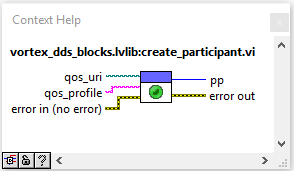
Terminal Type |
Optional |
Name |
Description |
Output consumed by |
|---|---|---|---|---|
Output |
no |
pp |
DDS Domain Participant entity instance |
create_publisher.vi create_subscriber.vi RegisterTopic.vi |
Input |
yes |
qos_uri |
QoS file uri |
|
Input |
yes |
qos_profile |
Name of QoS profile |
|
Input |
yes |
error in (no error) |
Input Error cluster |
|
Output |
yes |
error out |
Error out cluster |
3.4. create_publisher.vi¶
The create_publisher VI represents a DDS publisher entity.
In DDS, a publisher is “an object responsible for data distribution. It may publish data of different data types.”
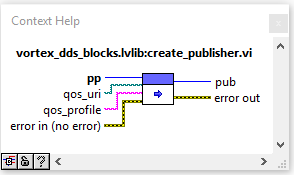
Terminal Type |
Optional |
Name |
Description |
Output consumed by |
|---|---|---|---|---|
Input |
no |
pp |
DDS Domain Participant entity instance |
|
Input |
yes |
qos_uri |
QoS file uri |
|
Input |
yes |
qos_profile |
Name of QoS profile |
|
Input |
yes |
error in (no error) |
Input Error cluster |
|
Output |
no |
pub |
DDS publisher entity instance |
create_writer.vi |
Output |
yes |
error out |
Error out cluster |
3.5. create_subscriber.vi¶
The create_subscriber VI represents a DDS subscriber entity.
In DDS, a subscriber is “an object responsible for receiving published data and making it available to the receiving application. It may receive and dispatch data of different specified types.”
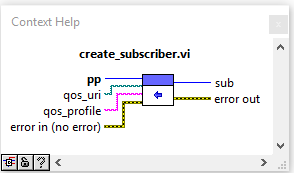
Terminal Type |
Optional |
Name |
Description |
Output consumed by |
|---|---|---|---|---|
Input |
no |
pp |
DDS Domain Participant entity instance |
|
Input |
yes |
qos_uri |
QoS file uri |
|
Input |
yes |
qos_profile |
Name of QoS profile |
|
Input |
yes |
error in (no error) |
Input Error cluster |
|
Output |
no |
sub |
DDS subscriber entity instance |
create_reader.vi |
Output |
yes |
error out |
Error out cluster |
3.6. create_writer.vi¶
The create_writer VI represents a DDS data writer entity.
In DDS - “The DataWriter is the object the application must use to communicate to a publisher the existence and value of data-objects of a given type.”
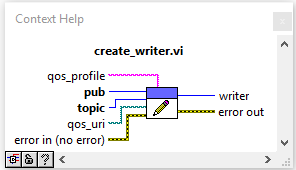
Terminal Type |
Optional |
Name |
Description |
Output consumed by |
|---|---|---|---|---|
Input |
no |
pub |
DDS publisher entity instance |
|
Input |
no |
topic |
DDS Topic entity instance |
|
Input |
yes |
qos_uri |
QoS file uri |
|
Input |
yes |
qos_profile |
Name of QoS profile |
|
Input |
yes |
error in (no error) |
Input Error cluster |
|
Output |
no |
writer |
DDS writer entity instance |
write.vi |
Output |
yes |
error out |
Error out cluster |
3.7. create_reader.vi¶
The create_reader VI represents a DDS data reader entity.
In DDS - “To access the received data, the application must use a typed DataReader attached to the subscriber.”
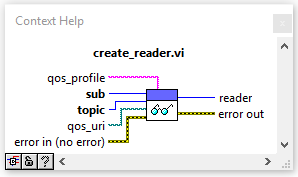
Terminal Type |
Optional |
Name |
Description |
Output consumed by |
|---|---|---|---|---|
Input |
no |
sub |
DDS subscriber entity instance |
|
Input |
no |
topic |
DDS Topic entity instance |
|
Input |
yes |
qos_uri |
QoS file uri |
|
Input |
yes |
qos_profile |
Name of QoS profile |
|
Input |
yes |
error in (no error) |
Input Error cluster |
|
Output |
no |
reader |
DDS reader entity instance |
read.vi |
Output |
yes |
error out |
Error out cluster |
3.8. wait_historical_data.vi¶
The wait_historical_data VI specifies that the Reader will wait for historical data to arrive. The timeout terminal is for setting time period (in seconds) determining how long the Reader should wait for the historical data. If the timeout is reached, then any remaining historical data may be interleaved with new data.
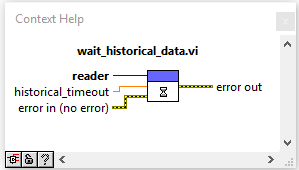
Terminal Type |
Optional |
Name |
Description |
Output consumed by |
|---|---|---|---|---|
Input |
no |
reader |
DDS Reader entity instance |
|
Input |
yes |
historical_timeout |
wait for historical data timeout (seconds) |
|
Input |
yes |
error in (no error) |
Input Error cluster |
|
Output |
yes |
error out |
Error out cluster |
3.9. delete_entity.vi¶
The delete_entity VI is used to delete a DDS entity. Connect the DDS participant to the entity terminal to delete the participant (pp) in a LabVIEW DDS application.
NOTE: If the user application VI stops due to an error and does not run to completion, the participant entity is not deleted and leaks occur. The participants are deleted once the user closes LabVIEW.
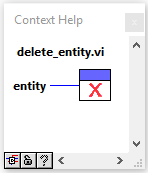
Terminal Type |
Optional |
Name |
Description |
Output consumed by |
|---|---|---|---|---|
Input |
no |
entity |
DDS entity instance |
